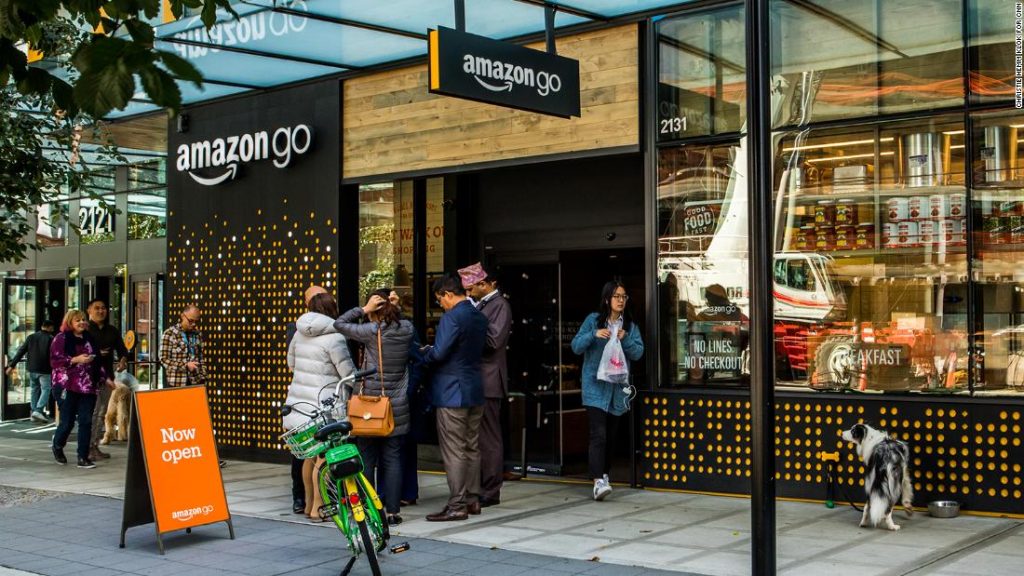Companies of all sizes in every industry are discussing the same two letters: AI
In a 14.7 billion dollar industry, expected to grow to $118.6 billion by 2025, everyone wants to enter the race, but the tech giants have flexed their financial muscles to give themselves a boost off the starting line.
The likes of Amazon, Google, and Baidu are investing billions to improve their existing operations and have been acquiring promising startups to squash the competition along the way. Where have the tech giants focused their efforts so far, and how have startups influenced their race strategy? Understanding the answers to these questions could be key as these companies also push the sustainability agenda.
Amazon disrupts food retail with AI
Amazon is building AI into every corner of their operations. The company was quick off the mark being one of the first to implement simple AI by recommending products to customers based on their previous purchases and reviews. Today AI has been incorporated into their warehouses, the voice assistant Alexa, and their physical stores – Amazon GO.
The first Amazon GO store opened up last year in Seattle and since then ten more stores have opened up across the US. The store eliminates the often time consuming check-out process familiar to all supermarket goers. Once you have scanned your Amazon account to enter the store, the rest of the process is fully automated as you can simply grab products and walk out. The store is filled with cameras that recognise customers and the products they take, automatically charging the bill to the correct Amazon account.
Bloomberg recently reported rumours of Amazon planning to open 3,000 GO stores by 2021, which could result in a $4.5 billion revenue. And of course, besides the revenue possibilities, the data collected is of enormous value to Amazon. But which company will utilise AI to drive more sustainable consumption in this future? And how will Amazon sustainably house their growing mountains of data?

Google’s winding route to the front of the race
Similarly to Amazon, Google is no stranger to AI. The company already uses it to improve the existing services including its Google search functions, Youtube video recommendations, Google photo facial recognition, and the Google voice assistant. Part of Google’s strategy to stay in front of the competitors has been acquiring AI talents from start-up companies, and bought DeepMind in 2014 for $500 million, despite a complete absence of revenue.
Google also acquired seven robotics companies in the US and Japan in 2013 for tens of millions of dollars, aspiring to develop humanoid robots. This turned out to be a dead-end for the company though, and the acquired companies were sold or shut down in the following years. Despite this, Google didn’t run out of steam and moved instead towards applying machine learning to robotics to improve their execution of simple tasks that today’s robots struggle with. This has been done with good success so far, but Google remains very secretive as to how they will use this technology in their operations so far.
Google has also recently launched a $25m Impact Challenge, where organisations of all sizes can submit concepts for how AI can be used to alleviate and address key societal and environmental challenges. We eagerly await the results, and won’t be surprised if Google snap up the best ideas for themselves…
Chinese state aid – performance enhancing?
Google’s Chinese equivalent, Baidu, has become an important player in the AI race in the eyes of the American tech giants who recently decided that it might be better to cooperate than to compete. Baidu became the first Chinese company to be invited to join the Silicon-Valley led alliance ‘Partnership for AI’.
“Any conversation about the future of AI that does not involve China is an incomplete conversation”
Terah Lyons, Executive Director of Partnership for AI
Baidu’s adoption of AI is diverse, including in voice assistance to intelligent medical devices, although their most recent focus has been on autonomous vehicles. What Baidu importantly benefits from in contrast to their American competitors is generous state support from the Chinese government, giving it an extra boost.
Baidu also has access to large datasets generated from the tech-loving Chinese population, where European and North American data privacy standards are no barrier. With the Chinese government rating AI highly on their 5-year agenda, Baidu has received support to develop their AI technology for autonomous vehicles. To be able to compete with the leading autonomous vehicle maker Tesla, Baidu formed Apollo, an open source autonomous vehicle technology platform. Leading car manufacturers such as BMW and Volkswagen are among the 130+ partners that have joined the platform.
With China’s air pollution still remaining five times higher than the limits set by the World Health Organization, will autonomous electric vehicles play a leading role in China’s sustainable transportation? If humanity has any hope of staying below 2 degrees global warming, then surely they must.

Where is the race heading?
Although a small number of companies lead the AI market, startups and competitors alike should not be too discouraged. Democratisation of AI has already started with the tech giants providing open access to some of their well-tested and used AI technologies as well as to AI development platforms. Smaller companies are now able to adopt basic AI functions such as online chatbots and facial recognition without having their own AI talents. Marinus Analytics is one of the companies that has successfully benefitted from Amazon’s face recognition tool in their fight against human trafficking.
As the need for AI in sustainability continues to grow, startups and giants alike must play their roles to create the exponential growth needed to achieve the Sustainable Development Goals. Even though some of the tech giants have started directing their AI resources towards sustainability, these efforts represent a fraction of the AI projects that are being implemented. We need to see sustainability being placed at the center of AI efforts to steer the race towards solving the most urgent problems humanity is facing. The question is, who will take the lead and become the AI champion of sustainability?
Want to know more?
Sustainia is a global sustainability advisory firm that specialises in ESG & impact technology. Headquartered in Copenhagen, with a global reach, we research and develop new insights and market opportunities. Sustainia is a co-founder of the Global Opportunity Explorer, the world’s largest platform for vetted and verified sustainable solutions, and serves as a matchmaker between business solutions and global challenges.
We are happy to hear your perspectives, so feel free to reach out on our website chat or hello@sustainiaworld.com.